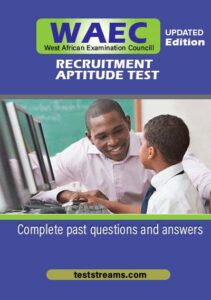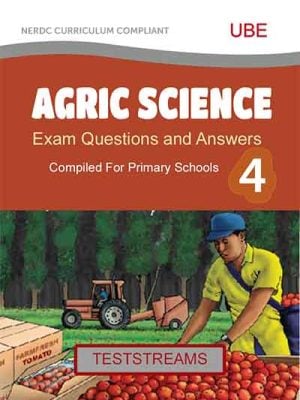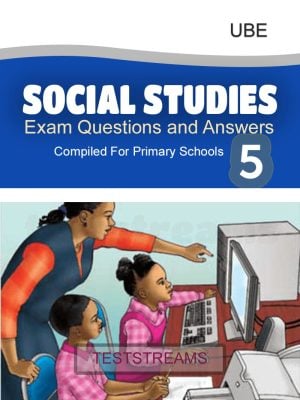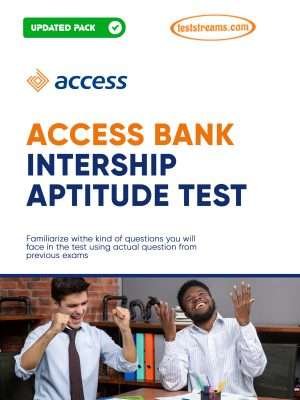WAEC RecruitmentAptitude Test Past Questions and Answers- [Free PDF Download]
Are you gearing up for the highly competitive WAEC Recruitment Aptitude Test? Aspiring candidates know that preparation is the key to success, and one of the most effective strategies for acing any test is to familiarize yourself with past questions and answers. In this blog post, we’ll dive into the importance of using past questions as a preparation tool and how they can significantly enhance your chances of success in the WAEC Recruitment Aptitude Test.
In conclusion, the WAEC Recruitment Aptitude Test demands thorough preparation, and utilizing past questions and answers is an excellent approach to enhance your performance. By familiarizing yourself with the test format, understanding question patterns, and practicing regularly, you can build the confidence and skills necessary to excel on test day. Remember, consistent effort and a strategic approach are your best allies in achieving success. Good luck!
About WAEC
Established in 1952, the vision of the West African Examinations Council is to be a world-class examining body, adding value to the educational goals of its stakeholders.
The West African Examinations Council is West Africa’s foremost examining board established by law to determine the examinations required in the public interest in the English-speaking West African countries, to conduct the examinations and to award certificates comparable to those of equivalent examining authorities internationally.
By this mandate, the Council is expected to:
Assist in the development of sound education
Ensure that educational standards are maintained
Give the people of West Africa a vision of the great potentials which lie beyond examinations.
Vision
To be a world-class examining body, adding value to the educational goals of its stakeholders.
Mission
To remain Africa’s foremost examining body, providing qualitative and reliable educational assessment, encouraging academic and moral excellence and promoting sustainable human resource development and international co-operation.
Core Values
Excellence
Integrity
Professionalism
Accountability
Transparency
Team work
Innovativeness
Why Past Questions Matter For WAEC Aptitude Test
- Familiarity with Test Format: The WAEC Recruitment Aptitude Test is known for its unique format and challenging questions. By practicing with past questions, you’ll gain a deeper understanding of the test structure, types of questions asked, and the overall difficulty level.
- Understanding Question Patterns: Every test has recurring question patterns and topics. By going through past questions, you’ll recognize these patterns, enabling you to anticipate the kind of questions you might encounter during the actual test.
- Time Management: Time is of the essence in any aptitude test. Practicing with past questions allows you to hone your time management skills. You’ll learn how to allocate time for different sections and how to tackle questions efficiently.
- Self-Assessment: Regular practice with past questions provides an excellent opportunity to evaluate your strengths and weaknesses. You can identify areas that need more attention and focus your efforts on improving those aspects.
Benefits of Using WAEC Aptitude Test past Questions and Answers
- Reduced Anxiety: Facing the unknown can be nerve-wracking. However, practicing with past questions can significantly reduce anxiety by giving you a clear idea of what to expect on the actual test day.
- Confidence Boost: As you become more familiar with the types of questions and their solutions, your confidence level will naturally increase. Confidence is a crucial factor in performing well during the test.
- Effective Revision: Past questions act as a condensed version of the entire syllabus. By practicing with them, you’re essenti
WAEC Aptitude Test Exam Format
The WAEC Aptitude Test is designed to evaluate your cognitive abilities, critical thinking, problem-solving skills, and compatibility with the company’s values and culture. The test comprises various sections that include:
- Numerical Reasoning: Assessing your ability to interpret numerical data, analyze graphs, and perform calculations under time constraints.
- Verbal Reasoning: Evaluating your comprehension skills, vocabulary, and logical reasoning through reading passages and associated questions.
- Logical and Abstract Reasoning: Measuring your ability to analyze patterns, draw logical conclusions, and think abstractly.
- Situational Judgment: Testing your judgment, ethical decision-making, and alignment with Shell’s core values in real-life workplace scenarios.
What Makes Our Past Questions And Answers Stand Out
In the realm of competitive examinations, the WAEC (West African Examinations Council) Aptitude Test holds a significant position. As aspirants gear up to conquer this challenge, a powerful tool emerges – the WAEC Aptitude Test Past Questions and Answers. Let’s delve into what makes these resources stand out and why they are essential for acing the test with flying colors.
1. Tailored Relevance: WAEC Aptitude Test past questions are specifically crafted to align with the unique test format, question patterns, and syllabus. This tailored relevance ensures that candidates practice with questions closely resembling those they will face during the actual test, thus preparing them comprehensively.
2. Insight into Format and Structure: One of the standout features of past questions is their ability to offer an in-depth understanding of the test’s format and structure. Aspirants get a firsthand glimpse into the distribution of questions across sections, time constraints, and overall test duration. This insight is invaluable in fine-tuning time management skills.
3. Pattern Recognition and Anticipation: Past questions provide a treasure trove of patterns and trends. As candidates delve into these questions, they start recognizing recurring question types, topics, and themes. This equips them with the ability to anticipate the nature of questions that may appear on the test, thus empowering them to prepare more strategically.
4. Realistic Simulation: Imagine entering the exam hall already familiar with the questions you are about to encounter. This simulation advantage is precisely what past questions offer. Candidates experience a reduction in test-day anxiety as they approach the test with a sense of familiarity, knowing what to expect.
5. Comprehensive Self-Assessment: Progress in test preparation requires effective self-assessment. Past questions and answers provide a platform for this assessment, enabling candidates to gauge their strengths, weaknesses, and areas that need further refinement. This introspection facilitates targeted studying and holistic improvement.
6. Confidence Building: The journey to success begins with self-confidence. Past questions instill a sense of confidence in candidates as they navigate through questions they’ve already tackled successfully. This confidence boost is a vital asset on the path to optimal performance.
7. Evolving Adaptation: While past questions offer a glimpse of the past, they also help candidates adapt to the evolving nature of the test. By engaging with a range of past questions from different years, aspirants become adept at handling variations in question patterns and difficulty levels.
8. Enhanced Study Efficiency: Studying for a test as comprehensive as the WAEC Aptitude Test demands efficiency. Past questions provide a concise yet comprehensive study resource. Instead of sifting through an entire syllabus, candidates can focus their efforts on the areas that matter most.
9. Clarification and Concept Reinforcement: In the journey to mastering any subject, repetition is key. Past questions allow candidates to revisit concepts, apply them in different scenarios, and reinforce their understanding. This reinforcement is essential for long-term retention and application.
Sample Questions for WAEC Aptitude Test
VERBAL REASONING TEST
Question:Choose the word that is most similar in meaning to “Benevolent”:
A) Cruel
B) Generous
C) Shy
D) Arrogant
Answer:B Generous
Question:Which word does not belong in the following group?
A) Square
B) Triangle
C) Circle
D) Rectangle
Answer:D Rectangle
Question: What is the next number in the sequence?
2, 4, 8, 16, ____.
A) 20
B) 24
C) 32
D) 64
Answer:C 32
Question:Arrange the following words to form a logical sentence:
A) Park, went, yesterday, Sarah, the
B) Went, Sarah, yesterday, the, park
C) The, park, Sarah, went, yesterday
D) Yesterday, Sarah, park, went, the
Answer:C The, park, Sarah, went, yesterday
Question: Which of the following words is an antonym of “Voracious”?
A) Hungry
B) Gluttonous
C) Indifferent
D) Ravenous
Answer:C Indifferent
Question:Complete the analogy:
Fish :Aquarium :: Bird : ____
A) Cage
B) Nest
C) Forest
D) Feeder
Answer:B NesT
Question:Choose the word that best fits the sentence::
His speech was so __________ that the audience fell asleep.
A) Engaging
B) Boring
C) Emotional
D) Joyful
Answer:B Boring
Question: If CAT is coded as 312, how is DOG coded?
A) 513
B) 416
C) 415
B) 614
Answer:C 415
Question:Which word is different from the others?
A) Orange
B) Apple
C) Banana
D) Strawberry
Answer:D Strawberry
Question: Choose the correct synonym for “Eloquent”:
A) Silent
B) Fluent
C) Confident
D) Confusing
Answer: B Fluent
Question: What comes next in the series?
Sun, Moon, Earth, Mars, ____
A) Venus
B) Saturn
C) Neptune
D) Jupiter
Answer:B Saturn
Question:Select the word that does not belong in the group:
A) Square
B) Triangle
C) Hexagon
D) Circle
Answer:d Circle
Question:Choose the word that best completes the analogy:
A) Feet
B) Toes
C) Legs
D) Ankles
Answer:A Feet
Question:Which word is the opposite of “Cautious”?
A) Careful
B) Reckless
C) Thoughtful
D) Prudent
Answer: B Reckless
Question:Complete the sentence with the correct word: The detective tried to _____ the clues to solve the mystery.
A) Ignore
B) Confuse
C) Unravel
D) Conceal
Answer:C Unravel
NUMERICAL REASONING TEST
Question: If 3x + 7 = 22, what is the value of x?
A) 5
B) 6
C) 8
D) 9
Answer:B 6
Question: What is 15% of 80?
A) 8
B) 10
C) 12
D) 15
Answer:A 12
Question: If a car travels at a speed of 60 km/h for 3 hours, how far does it travel?
A) 120 km
B) 150 km
C) 180 km
D) 200 km
Answer:B 180 km
Question: If a shirt originally costs $40 and is on sale for 20% off, what is the sale price?
A) $8
B) $12
C) $28
D) $32
Answer:C $28
Question: If the area of a square is 64 square meters, what is the length of one side?
A) 6 m
B) 8 m
C) 10 m
D) 12 m
Answer:B 8m
Question: Simplify: 4² + 3 × 5
A) 19
B) 29
C) 31
D) 41
Answer:B 29
Question: If a bookshelf has 5 shelves and each shelf can hold 10 books, how many books can the bookshelf hold in total?
A) 35
B) 40
C) 45
D) 50
Answer:B 40
Question: If the temperature rises from 20°C to 32°C, what is the percentage increase?
A) 40%
B) 50%
C) 60%
D) 70%
Answer:B 50%
Question: A pizza is divided into 8 equal slices. If you eat 3 slices, what fraction of the pizza have you eaten?
A) 3/8
B) 1/3
C) 3/4
D) 5/8
Answer: A 3/8
Question: If a company’s revenue is $500,000 and its expenses are $350,000, what is the company’s profit?
A) $150,000
B) $200,000
C) $250,000
D) $300,000
Answer:A $150,000
Question: If a rectangle has a length of 12 cm and a width of 8 cm, what is its perimeter
A) 16 cm
B) 32 cm
C) 40 cm
D) 48 cm
Answer:C 40 cm
Question: Solve for y: 2y – 5 = 13
A) y = 7
B) y = 8
C) y = 9
D) y = 10
Answer:A y = 7
Question:If a recipe requires 3/4 cup of flour and you want to make 2 batches, how much flour do you need in total?
A) 1/2 cup
B) 1 cup
C) 1 1/2 cups
D) 2 cups
Answer:C 1 1/2 cups
Question: What is 30% of 150?
A) 30
B) 45
C) 50
D) 60
Answer:B 45
Question: If a train travels at a speed of 80 km/h for 2.5 hours, how far does it travel?
A) 100 km
B) 160 km
C) 200 km
D) 250 km
Answer:D 250 km








